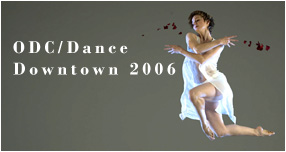ODC,(Not) As Easy as 1-2-3
ODC: Program 1
Yerba Buena Center for the Arts
March 4, 2006
It’s March, which could only mean one thing. No, not preseason baseball. Or the Oscars. Or my grandmother’s birthday. No, it’s the return of ODC to Yerba Buena Theater with it’s annual Dancing Downtown series. This year marks the company’s 35th, and to help celebrate, Joanna Berman, former principal dancer with San Francisco Ballet, will be performing in
“Part of a Longer Story,” divided into 3 parts, is set to Mozart’s Clarinet Concerto in D. Way choreographed the Second Movement (1993) prior to the First (1995) and Third Movements (2002), but this isn’t why it stood out among the other sections Saturday night. Berman’s technically and emotionally driven performance with Private Freeman elevated the movement from basic ballet-based positions to connected thoughts that portrayed the romance and elegance of modern dance. And no, I didn’t mean for this to rhyme. Berman’s attitude turn wasn’t just an attitude turn, but she gave it feeling and purpose. As she moved, each position appeared to connect to the next, with transcending liquidity and lacking time yet enveloping space, sort of like when you pour honey out of a jar. Berman expressed herself through her body as opposed to with it, and this is what made watching her so special.
The rest of “Part of a Longer Story” just didn’t compare. Perhaps it’s unfair to compare the company dancers, who are mainly younger and have less stage experience, to Berman’s more mature and complete performance. Yet I think Berman elevated Way’s choreography in a way that only she could: with an exceptional performance.
Way also debuted “time remaining” with music by Ara Anderson, and Iron and the Albatross. “time remaining” supposedly focused on the exploration of the “loss of individual will, manipulation and the lure of righteousness.” Had I not read that in the brochure, I would never have guessed. I really thought this was “Project Runway” meets modern dance. Not until the last few minutes, when dancers changed into potato-type sacks, did I even begin to realize “time” wasn’t solely about fashion; yet everything preceding screamed “fashion”: dancers in linen-like white clothing, partnering sequences with dressforms, a designer and his muse (which perhaps wasn’t a muse after all), and clothes falling off to reveal a canvas (or in this case, those canvas-like sacks). Way tackled an interesting subject, but I’m not sure if her construction provided the appropriate canvas needed.
K.T. Nelson’s “Lost at Sea” returned this year, and while I enjoyed it, I felt last year’s performance has more sparkle and overall continuity. There’s a constant struggle between moving ahead or in some other direction or tangent, and Nelson’s partnering and group work succeeds in transporting her movement from thoughts to solid, conceptual ideas. Also, newcomer Apprentice Elizabeth Farotte performed with clean attack and languid lines and is a wonderful addition to the company. In fact, during one of her first entrances, for a few seconds, I thought she was Joanna Berman. Now how’s that for a compliment?
ODC continues with Program 2 (I'll be there on the 10th), and I'm hopeful that things will look up. Perhaps my expectations are high, but in comparison to last year, I feel that the dancers aren't as strong technically and the choreography a little too predictable. Here's hoping this anniversary season rises to the challenge of more than just matching Berman's prowess on the stage.




No comments:
Post a Comment